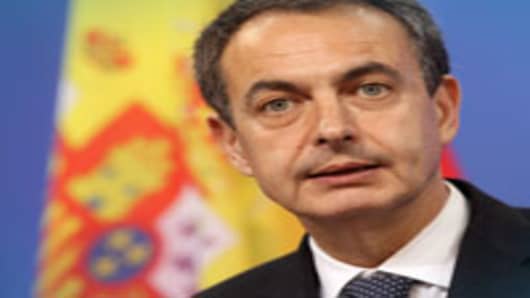With his Socialist Party facing a double-digit deficit in opinion polls, Prime Minister José Luis Rodríguez Zapatero is gambling that his decision not to seek a third term will bolster his party’s chances to retain power.
Mr.Zapatero’s announcement on Saturday followed months of speculation over his political future amid aneconomic downturn that considerably undermined his chances of winning re-election.
He did not indicate a preferred successor, leaving open the question of who will lead the Socialists in a general election that is expected to be held in March 2012.
The main opposition, the Popular Party, knows who its candidate will be: Mariano Rajoy, who lost to Mr.Zapatero in 2004 and 2008.
The party’s secretary general, María Dolores de Cospedal, responded to Mr.Zapatero’s announcement by urging him to call an early general election.
But Mr.Zapatero told a rally in Murcia on Sunday that the Popular Party and Mr.Rajoy “will now have to build their project, because until now they have only dedicated themselves to attacking me and saying that everything was the fault of Zapatero.”
One likely candidate for the Socialist Party leadership post is Alfredo Pérez Rubalcaba, the interior minister who was promoted to the additional job of deputy prime minister last fall in Mr.Zapatero’s most recent cabinet shuffle.
Mr.Rubalcaba, 59, could face a challenge from the defense minister, Carme Chacón, 40, also seen as the champion of a new generation of Spanish women.
Mr.Zapatero told the Socialists’ federal committee that he would not seek re-election but would stay in office “until the last day” of his second term.
He also urged his party to wait until after regional and municipal elections scheduled for May 22 to select a new leader.
His decision, he said, was designed to put “an end to what was perceived as an uncertainty.” The timing of Mr.Zapatero’s announcement could have economic repercussions.
The government has been trying to force the country’s weakest banks to raise more capital and has been negotiating with trade unions to agree on changes to Spain’s rigid system of collective bargaining.
Mr.Zapatero also has pledged to impose greater fiscal discipline, in particular among regional governments, to cut Spain’s budget deficit to 6 percent of gross domestic product this year. It was 11.2 percent in 2009.
Luis de Guindos, the director of the Center for the Financial Sector, a private institute in Madrid, said, “The next months will be vital for the Spanish economy, but the main risk now is that Zapatero will become a lame duck and the Socialist Party will be focused on who will be the next candidate instead of implementing more reforms.”
The Popular Party is expected to make big gains in the May 22 elections, opinion polls indicate, including in Socialist strongholds like the southern region of Andalusia.
In calling for an early general election Ms.de Cospedal said the Zapatero government had already lost “precious time to work for the citizens and resolve their problems.”
Some Socialists are already warning against internal feuding and raised concerns about a possible leadership vacuum in coming months.
Juan Carlos Rodríguez Ibarra, a veteran Socialist politician, said that “perhaps policemen and soldiers will be fighting,” a barbed reference to the fact that the police are part of Mr.Rubalcaba’s ministerial portfolio while Ms.Chacón oversees the army.
Mr.Zapatero was elected in 2004 following the terrorist attacks on commuter trains in Madrid and amid strong discontent with Spain’s involvement in the Iraq war. His assumption of power also coincided with an economic boom.
But the worldwide financial crisis has put Spain in investors’ line of fire because of its budget deficits and has set off a collapse in the property sector that has burdened its banks with bad loans.
The country’s unemployment rate has reached 20 percent, the highest among the nations that use the euro.
Mr.Zapatero’s popularity has plummeted close to historic lows for a Spanish head of government, according to the most recent opinion polls.


